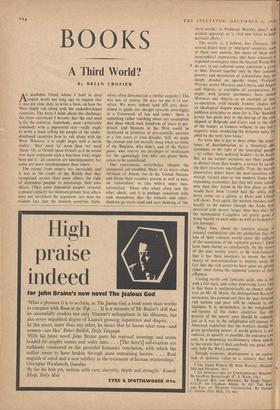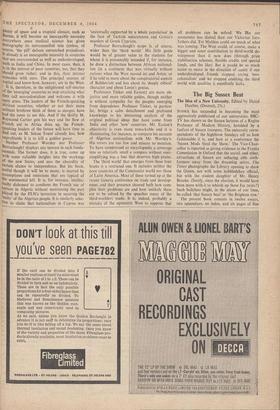BOOKS
A Third World?
By BRIAN CROZIER
AN academic friend whom I hold in deep ,MLrespect wrote not long ago to suggest that it was my clear duty to write a book on how the West might rub along with the underdeveloped countries. The more I think about this challenge, the.more convinced I become that the real need is for the converse. Somebody, soon—preferably somebody with a pigmented skin—really ought .to write a book telling the people of the under- developed countries how to rub along with the West. Whoever it is might begin with a harsh reality: 'they' need 'us' more than 'we' need 'them.' Or, as Orwell (poor Orwell, as if he would ever have expressed such a heartless view) might have put it: all countries are interdependent, but some are more interdependent than others.
The retreat from empire was inevitable, and it was to the credit of the British that they recognised, sooner than some others, the right of dependent peoples to mismanage their own affairs. (That some dependent peoples revealed a greater capacity for mismanagement than others does not invalidate the argument; nor does the evident fact that the western countries them- selves often demonstrate a similar capacity.) This was not, of course, the way we put it to our- selves. We were, indeed (and still are), deter- mined to guide our charges towards sovereignty in a framework of law and order: there is something rather touching about our assumption that ideas which took hundreds of years to ger- minate and blossom in the West could be inculcated in primitive or pre-scientific societies in a few years or even decades. Still, we made the attempt and feel morally smug when we think of the Belgians, who didn't, and of the Portu- guese, who reserve the privileges of civilisation for the agonisingly few who can prove them- selves to be assimilated.
Our consciences, nevertheless (despite the smugness), are troubled. Many of us wince when Africans or Asians rise in the United Nations and blame their troubles, present as well as past, on 'colonialism' or (the with-it ones) 'neo- colonialism.' Those who wince often turn the other cheek; and it is perhaps consistent with such masochism that the wincers and other- checkers go starry-eyed and start thinking of 'the third world,' as Professor Worsley does,* with evident approval, as 'a vital new force in inter' national affairs.'
The reality is, I believe, less romantic. The several dozen 'new' or 'emergent' countries, some of them true nations, but many of them Filer:: geographical expressions, that have achieved or regained sovereignty since the Second World war
• do not, in any coherent sense, constitute a grout or bloc. Drawn together only by their common
poverty and detestation of colonialism, they are deeply divided on specific issues. Professor Worsley names Morocco and Liberia. and Angola and Algeria, as examples of co-operation. He might, with greater pertinence, have named Morocco and Algeria as an example of non- co-operation, with bloody frontier clashes and an ideological dispute about monarchic and le" publican principles to show for it. The 'Bandung group' has given way to the line-up of the non" aligned at Belgrade and Cairo and to the club of the hungry at Geneva without, in any but 3 negative sense, producing the dynamic unity iro' plied by the term 'new force.'
To write this is not to deny either the impor" lance of decolonisation as a historical pbe" nomenon, or the right of the 'emerging' peoples ---or rather, their political leaders—to be heard. But we do neither ourselves nor their peoples' as distinct from their leaders, a service by accept- ing their strictures uncritically. True, the western imperialists didn't leave the new'countries with enough trained men to run modern States with expanding economies; but they left more trained men than they found in the first place or than would have been trained had the white man never come (as a glance at Haiti and Liberia will show). True again, the western invaders were beastly to the natives (though the Arabs have persisted with slavery longer than they did); hot the independent Congolese are pretty good at being beastly to each other as well as to defence' less hostages. What, then, about the Leninist charge of colonial exploitation and the prediction that the loss of their colonies would cause the collapse of the economies of the capitalist powers? The have been, shown so conclusively, by the events of the past twenty years, to be wish-fantasies that it has been necessary to invent the neW theory of neo-colonialism to explain away the fact that the rich countries have gone on getting richer since losing the supposed sources of their affluence.
Casting myths and fantasies aside, one is left with a few stark, and rather depressing, facts. One is that there is mathematically .no chance what' ever (as Mr. H. Myint, the distinguished Burmese economist, has pointed out) that the 'gap' between rich nations and poor will be reduced in our lifetimes. It is, nevertheless, in the enlightened self-interest of the richer countries that the poverty of the poorer ones should be reduced' just as it was in the enlightened self-interest of American capitalism that the workers should be given purchasing power; if world poverty is not reduced, as quickly as possible, the outcome can only be a deepening revolutionary chaos which, to the extent that it does anybody any good, will only help the West's enemies, Though economic development is an aspira- tion of dubious value in a country that has *Titn THIRD WORLD. By Peter Worsley. (Weiden- feld and Nicolson, 36s.)
t AN INTRODUCTION TO CONTEMPORARY HISTORY.
By Geoffrey Barraclough. (C. A. Watts, 15s.)
BALLOT Box AND .BAYONET. By Hugh Tinker. (O.U.P. for Chatham House, 8s. 6d.) Tim Risc AND FALL OF WESTERN COLONIALISM. By Stewart C. Easton. (Pall Mall, 37s. 6d.) Plenty of space and a tropical climate, such as Burma, it will become an inescapable necessity everywhere once medical science has given 'demography its untrammelled rein (unless, of course, 'the pill' defeats entrenched prejudices). It already is an inescapable necessity in countries that are overcrowded as well as underdeveloped, such as India and China. In most cases, then, it Is in the interest of poor countries, too, that they 'should grow richer; and in this, their interest coincides with ours. The principal sources of capital and know-how, however, are in the West.
It is, therefore, in the enlightened self-interest of the 'emerging' countries to stop attacking what they call neo-colonialism and welcome it with open arms. The leaders of the French-speaking African countries, whether or not their more militant brethren think of them as stooges, have had the sense to see this. And if the thrifty M. Raymond Cartier gets his way and the flow of French aid to Africa dries up, the French-, speaking leaders of the future will have time to lind out, as M. Sekou Tours already has, how unprofitable it is to kill a golden goose.
Neither Professor Worsley nor Professor Barraclought displays any interest in such funda- mentals. The former does, it is true, come up With some valuable insights into the workings of the new States, and sees the absurdity of certain claims to independence. But his book, useful though it will be to many, is marred by assumptions and omissions that are typical of the sentimental left. It is, for instance, intellec- tually dishonest to condemn the French use of torture in Algeria without mentioning the part Played by the FLN's terrorism in securing the !Jolty' of the Algerian people. It is similarly selec- tive to claim that nationalism in Cyprus was 'universally supported by a whole population' in the face of Turkish separateness and Grivas's murders of Greek Cypriots.
Professor Barraclough's scope is, of course, wider than the 'third world.' His little guide would be of greater value to the students for whom it is presumably intended if, for instance, be drew a distinction between African national- ism (in a continent that was virtually without nations when the West moved in) and Asian; or if he told us more about the conspiratorial aspects of Bolshevism and less about its 'deeply ethical' character and about Lenin's genius.
Professors Tinker and Easton: are more ob- jective and more reliable guides, though neither is without sympathy for the peoples emerging from dependence. Professor Tinker, in particu- lar, brings a calm detachment and profound knowledge to his interesting analysis of the original political ideas that have come from India and other `new' countries. Mr. Easton's objectivity is even more remarkable and it is illuminating, for instance, to compare his account of Algerian nationalism with _ Mr. Worsley's. His errors are too few and minute to mention. To have compressed so encyclopaedic a coverage into so relatively small a compass without over- simplifying was a feat that deserves high praise.
The 'third world' that emerges from these four books is a restricted one. It includes neither the poor countries of the Communist world nor those of Latin America. Most of these turned up at the recent Geneva conference on trade and develop- ment, and their presence showed both how com- plex their problems are and how unlikely these are to be solved by the speeches many of the third-worlders made. It is, indeed, probably a mistake of the optimistic West to suppose that all problems can be solved. We like our economics less dismal than our Victorian fore- fathers did. Yet Malthus could see much of what was coming. The West could, of course, make a bigger and saner contribution to third-world de- velopment than it now does (through price stabilisation schemes, flexible credits and special funds, and the like). But it would be so much easier to move in the direction of sanity if our underdeveloped friends stopped crying 'neo- colonialism' and we stopped crediting the third world with qualities it manifestly lacks.



































 Previous page
Previous page